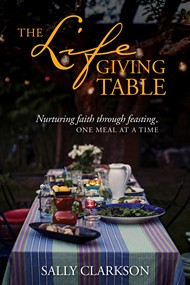In an ideal world, we would all be surrounded by throngs of people who want our best, know our story, share our deepest convictions, and are willing to walk with us through life. However, as so many of us are keenly aware, this is not usually the case. Unfortunately, the common reality of our world is isolation, loneliness, and superficial, fake, or damaging friendships.
I am all too well acquainted with this reality. I’m sure you are too. Even the early church had its squabbles and parting of ways (see Acts 15). But giving up on community and friendship is not the answer to this issue. Rather, we ought to pursue godly friendships with tenacious intentionality. Seek out godly friends, and when you find them, cherish them. Do everything you can to nurture these friendships, investing time and attention. And don’t forget to invite them to share your table, because sharing food is one the very best ways to build relationships.
And what if a friendship brings pain?
When two people with different personalities, backgrounds, and beliefs engage in a relationship, there are bound to be areas of friction. And when the two people involved happened to be sinners (as we all are), we inevitably end up hurting one another. A careless remark, an absence when we are needed, a philosophical disagreement, a petty betrayal—any of these can cause a painful rift between friends. Then there are those people we encounter whose lives have been so damaged in childhood that they have no idea how to relate in a healthy way.
When conflict happens with friends, we do well to be persistent in seeking to repair the relationship.
Pray urgently about the situation.
Try to see things from the other person’s point of view. Seek forgiveness and be willing to offer it. Strive for reconciliation. A friendship is a precious thing, not to be lightly discarded.
But if the misunderstanding persists, the best advice I can give is this: (1) do your best to be a peacemaker, and (2) entrust people to God. Romans 12:18 says, “If it is possible, as far as it depends on you, live at peace with everyone” (niv). But implied in that same verse is the reality that living in peace is not always up to us.
Not all friendships last a lifetime or remain at the same level of closeness. We should always seek to extend grace in our friendships, to be kind, to try to understand. But if, as happens to all of us, a friendship cools or ends, check your own heart to make sure you are walking in godliness and then release the situation to God. You can trust that the God of community and relationship can take care of your heart and your friend’s heart too.
Christian friends are not perfect, just redeemed, like us.
Excerpt pulled from The Lifegiving Table by Sally Clarkson.
___

The Lifegiving Table by Sally Clarkson
Make your table a place where your family and friends long to be—where they will find rest, renewal, and a welcome full of love.
Beloved author Sally Clarkson (The Lifegiving Home, Own Your Life, Desperate) believes that meals lovingly served at home—and the time spent gathered together around the table—are a much-needed way to connect more deeply with our families and open our kids’ hearts. Food and faith, mingled in everyday life, become the combination for passing on God’s love to each person who breaks bread with us.
In The Lifegiving Table, Sally shares her own family stories, favorite recipes, and practical ideas to help you get closer to the people you love . . . and grow in faith together.






